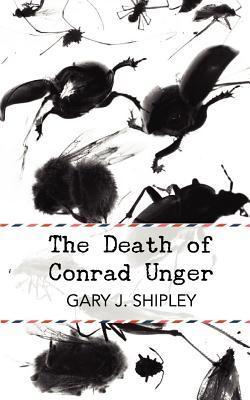
| Title | : | The Death of Conrad Unger |
| Author | : | |
| Rating | : | |
| ISBN | : | 0615600301 |
| ISBN-10 | : | 9780615600307 |
| Language | : | English |
| Format Type | : | Paperback |
| Number of Pages | : | 48 |
| Publication | : | First published March 18, 2012 |
The death by suicide of Gary J Shipley's close friend, Conrad Unger (writer, theorist and amateur entomologist), has prompted him to confront not only the cold machinery of self-erasure, but also its connections to the literary life and notions surrounding psychological bewitchment, to revaluate in both fictional and entomological terms just what it is that drives writers like Unger to take their own lives as a matter of course, as if that end had been there all along, knowing, waiting. Like Gerard de Nerval, David Foster Wallace, Ann Quin and Virginia Woolf before him, Unger was not merely a writer who chose to end his life, but a writer whose work appeared forged from the knowledge of that event's temporary postponement. And while to the uninitiated these literary suicides would most likely appear completely unrelated to the suicide behaviors of insects parasitized by entomopathogenic fungi or nematomorpha, within the pages of this short study we are frequently presented with details that allow us to see the parallels between their terminal choreographies. He investigates what he believes are the essentially binary and contradictory motivations of his suicide case studies: where their self-dispatch becomes an instance of necro-autonomy (death as solution to an external thraldom, or the zombification of everyday life as something requiring the most extreme form of emancipation), while in addition being an instance of necro-equipoise (death as solution to an internal thraldom, or the anguish of no longer being able to slip back comfortably inside that very everydayness). The deadening claustrophobia of human life and achieving a stance outside of it: both barbs on the lines that can only ever detail the sickness, never cure it. Through extracts and synopses of Unger's books, marginalia and underscorings selected from his extensive library, and a brief itinerary of his movements in that last month of exile, a picture of the writer's suicidal obsession begins to form, and it forms at the expense of the man, the idea eating through his brain like a fungal parasite, disinterring the waking corpse to flesh its words.
The Death of Conrad Unger Reviews
-

That Woolf identified herself intimately with her work is evident from her personal correspondence; and during those times when her work was attacked, Woolf claimed to be sensible of the blows; more and more she felt she was the work, inseparable from it, that the work was the reality of her self and that without it she was rendered an obliterative absence, left nurturing the wraith-hollowed organ of a progressively itinerant and displaced identity.
[...]But whether he did actually behold the untwining of a serpentiform ghoul, that the suicide was indeed "inside her" [Ann Quin] as it was with Anne Sexton and Sylvia Plath and that this was it leaving, its last witnessed act, is still very much a matter of conjecture.
[...]
The work of which Blanchot speaks is that of acceptance, wherein death becomes consonant with our sense of identity. But no light is shed, no attainment made and no mastery gained, because one does not go about shaping the end of self, rather one detects that it’s that very end that has shaped them all along. This discovery is moonless and ungovernable; it is like realizing that you’re in the process of being swallowed, and that it’s only your foredoomed refusal to be food that prevents you from slipping down. The work is beyond he who undertakes it in the same way that a writer’s work is beyond the writer: its terrain negates, and through negating embodies the very negation through which it was conceived, that haunted lacuna that originated it. -

I loved this way more than I can say here.
"There are ways of dying that don't involve death, and you can suffer them by the hour."
It's an injustice to summarize what's going on here, but I'll try. The Death of Conrad Unger is an essay-length exploration of suicides in literature and their connection to "insects parasitized by entomopathogenic fungi."
It sounds weird but the book's conjectures are argued with unusual elegance and backed up with many references to great writers, including Ann Quin, Kafka, Burroughs, Beckett and Dante.
Absolutely brilliant. -

Eloquent non-sense which seems to hit a nerve once in a while.
If it be considered an eulogy or a remembrance it is a great one, else...
-

This book is amazing.







